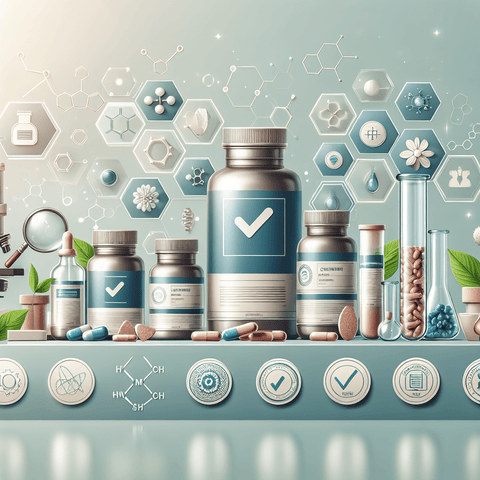Introduction: Navigating the World of Liquid Supplements
In an increasingly health-conscious world, nutritional supplements have evolved from niche health store products into mainstream wellness essentials. Whether it's boosting immunity, improving energy, or supporting bone health, supplements have become an integral part of many people’s daily routines. Among these, there has been a noticeable shift toward liquid supplements—a format that promises quick absorption, flexibility in dosing, and convenience. But with traditional pills and capsules still dominating the shelves, many are left asking the critical question: Are liquid supplements more effective than pills?
This blog post delves into this essential topic by comparing the effectiveness of liquid supplements versus pills based on absorption rates, bioavailability, usability, and value. It also explores key use cases and who might benefit most from choosing liquid over solid forms. We will unravel the scientific evidence, break down the pros and cons of each form, and help you navigate the supplement aisle with greater confidence. Plus, we’ll explore helpful resources, including collections from TopVitamine's Vitamin D range and others, to help you find the right products for your needs.
The Rise of Liquid Vitamins in the Supplement Industry
Liquid vitamins are quickly becoming a staple in nutritional supplementation. Factors such as an aging population, increased prevalence of digestive issues, and a growing preference for plant-based and holistic wellness solutions have contributed to the expansion of the liquid supplement market. Traditionally found in pharmacies and niche stores, liquid supplements are now widely available in supermarkets and online platforms like TopVitamine.com.
Some of the most commonly available nutrients in liquid form include Vitamin D, Vitamin B12, and multivitamins. These liquids are typically packaged in bottles with droppers or measuring caps or available as single-serve ampoules. They appeal especially to populations who dislike or struggle with swallowing pills—elderly individuals, children, and those with dysphagia. The customizable nature of liquid supplements is another major attraction. Unlike pills, which come in fixed doses, liquid vitamins allow users to adjust their intake according to medical advice or personal preference.
Another noteworthy benefit is the perceived faster onset of action. Users often report experiencing benefits sooner than with pills, although this is partially anecdotal and may vary by individual and nutrient type. However, the appeal of liquids is not without its downsides. Taste can be a significant drawback, particularly if artificial sweeteners or strong natural flavors are used. The shelf life of liquid supplements also tends to be shorter, and many require refrigeration after opening, which can compromise convenience. Furthermore, the production of liquid vitamins can be more complex, leading to varying levels of nutrient stability compared to tablets or capsules.
Despite these considerations, consumer interest in liquid supplements continues to rise, underpinned by a culture that increasingly prioritizes personalization, convenience, and perceived efficacy. For instance, products containing Vitamin K aimed at supporting bone health are now available in liquid formats that allow precise dosing and synergistic formulations with other fat-soluble nutrients like Vitamin D and magnesium.
Supplement Absorption Rates: Liquid vs. Pills
Understanding how a supplement performs in the body begins with absorption—the first critical step in nutrient utilization. When comparing the absorption rates of liquid supplements and pills, the concept of bioavailability becomes central. Bioavailability refers to the proportion of a nutrient that is absorbed into the bloodstream and made available for use or storage in the body. This can vary significantly depending on the supplement format.
Liquid supplements, by their very nature, bypass many of the physiological processes required to break down tablets or capsules. In pill form, supplements pass through the stomach where they undergo dissolution before the nutrients can be absorbed in the small intestine. This additional step can delay and sometimes reduce the uptake of nutrients, particularly if the individual's digestive system is compromised due to age, disease, or gastrointestinal disorders.
Scientific studies support the idea that liquid formulations generally offer a higher and faster absorption rate than solid ones. A study published in the "Journal of Pharmacy and Pharmacology" found that certain liquid supplements had significantly higher bioavailability compared to their tablet counterparts. Another study in the "Journal of Clinical Pharmacology" noted that participants consuming a liquid form of Vitamin E achieved quicker and more complete absorption than those ingesting it in capsule form.
Beyond the format alone, real-world factors like the presence of food, gut health, age, and even gender can influence absorption. Taking fat-soluble vitamins such as Vitamin D with a meal containing fat can improve bioavailability, regardless of whether the supplement is in liquid or pill form. People with reduced stomach acid, a common condition in older adults, may particularly benefit from the easier absorption pathway provided by liquid vitamins.
Nonetheless, it’s important to note that not all liquid supplements are superior—and not all pills underperform. Formulation quality, ingredient sourcing, and correct usage play critical roles. Some capsules are enteric-coated or designed for delayed release to optimize absorption in specific areas of the digestive tract. Therefore, when choosing between a pill and a liquid, a thorough evaluation of your individual health circumstances and consultation with a healthcare provider are important steps.
Liquid Multivitamins: A Convenient All-in-One Solution?
Liquid multivitamins present an innovative approach to daily supplementation, bringing together multiple essential nutrients in a single, drinkable format. These products are designed to simplify complex supplement routines, particularly for individuals juggling multiple capsules or tablets daily.
Liquid multivitamins typically contain a blend of water-soluble vitamins such as B-complex and Vitamin C, fat-soluble vitamins like A, D, E, and K, and often essential minerals such as magnesium or zinc. High-quality formulations may also include herbal extracts, amino acids, or antioxidants, offering comprehensive nutritional support in one convenient dose. Some feature synergistic blends optimized for absorption, where nutrients enhance each other's bioavailability.
The user-friendliness of liquid multivitamins is their standout feature. For instance, children and senior citizens who experience difficulty with pill swallowing often find compliance much easier with pleasant-tasting liquids. For those struggling with multiple health conditions—or simply aiming for a more efficient approach—combining all necessary nutrients into one dose reduces the likelihood of missing key vitamins and minerals. This is particularly relevant to individuals with chronic fatigue, malabsorption syndromes, or restrictive diets.
A practical example can be found in the growing consumption of liquid multivitamins offered by premium platforms such as TopVitamine.com. Their product lines allow users to obtain a well-balanced nutrient profile tailored to their age, lifestyle, and dietary deficiencies. Some formulations are even enriched with ingredients like omega-3s, such as those found in DHA + EPA supplements, further enhancing cardiovascular and cognitive support in a single serving.
Despite their advantages, consumers should pay close attention to ingredient interactions and dosages. Not all nutrients are stable in liquid form, and excessive intake—especially of fat-soluble vitamins—can pose risks. Storage conditions, such as refrigeration to maintain potency, also play a role in the product's long-term efficacy. As always, quality assurance through third-party testing and label transparency should guide smart purchases.
Understanding the Bioavailability of Supplements
Bioavailability is more than a buzzword—it's the cornerstone of effective supplementation. It determines how much of a given nutrient reaches the bloodstream in an active form. Poor bioavailability leads to nutrient waste, where consumed substances pass through the body without delivering meaningful benefits.
Several factors affect bioavailability, starting with the delivery form. Liquid supplements, due to their solubilized state, often reach peak blood concentrations faster than tablets or capsules, which must be broken down first. This immediate availability can be especially critical for nutrients required in response to an acute need, such as immune support from Vitamin C.
Formulation matters hugely. Nanotechnology, for example, is used in some high-end supplement lines to increase the surface area of nutrients, enhancing solubility and absorption. These methods are more easily incorporated into liquid forms than pills. Nutrient interactions also play a role. For instance, magnesium enhances Vitamin D activation, while antioxidants such as Vitamin C can optimize iron absorption. Thoughtful liquid formulations can leverage these synergies more flexibly than rigid pill combinations.
However, both over- and under-supplementation remain concerns. Not all highly bioavailable supplements are inherently “better.” For instance, synthetic Vitamin K1 might be more bioavailable than natural K2, yet the latter plays more complex roles in bone and cardiovascular health. Moreover, individual health markers—such as liver function, digestive enzyme activity, and metabolic rate—significantly influence how supplements are processed.
The design of the supplement, whether it's liposomal, emulsified, or water-soluble, plays further roles in determining absorption. Modern liquid supplements now utilize advanced delivery systems to optimize bioavailability, a trend evident in curated supplement ranges from trusted sources like TopVitamine.
Liquid Nutrition: Comprehensive Wellness in a Bottle
Beyond micronutrients, the concept of liquid nutrition extends to meal replacement drinks and wellness elixirs formulated to deliver macronutrients and micronutrients in a single product. These “complete” liquid nutrition solutions offer notable benefits, particularly for individuals recovering from illness, athletes, busy professionals, or those with chewing or swallowing difficulties.
Liquid meal replacements can support muscle repair, cognitive function, and immune health by offering a quick, balanced intake of protein, fats, carbohydrates, vitamins, and minerals. They’re also helpful for patients experiencing reduced appetite or undergoing treatments that affect digestion. In such cases, ready-made liquid formulas can ensure that nutritional needs are met without taxing the digestive system.
Incorporating functional ingredients such as probiotics, prebiotics, adaptogens, or omega-3s, liquid nutrition supplements are designed to do more than just fill dietary gaps. For example, a complete drink enriched with nutrients like magnesium offers support for muscle function and nervous system regulation, making it ideal for fitness-conscious individuals or those with physically demanding lifestyles.
Despite their efficacy, liquid nutrition should not replace whole-food meals unless medically advised. Unbalanced formulations, hidden sugars, or inadequate fiber can affect metabolic health and blood sugar control. Moreover, long-term reliance on liquid meals can alter gut microbiota and reduce chewing efficacy, particularly in children and seniors.
Therefore, while comprehensive liquid nutrition offers versatility and convenience, it should be used as part of a well-rounded dietary program and under professional guidance when used long-term.
Comparing Cost, Convenience, and Personal Preference
One major consideration for many consumers is the overall value proposition: how do liquid supplements compare to pills in terms of cost and convenience? Liquid supplements tend to be more expensive upfront due to their specialized formulations, packaging requirements, and manufacturing complexities. A one-month supply of a high-quality liquid multivitamin may cost significantly more than the equivalent in tablet form.
However, some users may find the higher bioavailability and faster absorption rate a justifiable trade-off for higher pricing. The convenience of customized dosing and faster onset of action can provide quicker results, particularly during periods of nutrient deficiency or increased physical demand.
Portability and ease of use vary between forms. Pills are often more travel-friendly, with low risk of leakage or spoilage. In contrast, liquid vitamins may require refrigeration and can be messy or inconvenient in transit. Yet, for daily at-home use, they may prove more convenient—especially when added to smoothies or juices.
Taste preferences also play a significant role. While some love the fruity or minty flavors of liquid supplements, others struggle with strong tastes or thick consistencies. Formulation options with natural sweeteners or stevia are growing in popularity, reducing the reliance on artificial additives. Ultimately, the choice often comes down to individual preference, lifestyle, and specific health objectives.
Personalized supplements, increasingly offered by online providers, allow customers to select formats that suit their body’s needs. Whether you opt for high-absorbency liquid omega-3s or shelf-stable multivitamin tablets, platforms like TopVitamine.com offer a wide array of options to cater to every preference.
Final Verdict: Are Liquid Supplements the Superior Choice?
So, are liquid supplements more effective than pills? The answer depends on your individual health needs, preferences, and conditions. Liquid supplements tend to offer higher absorption rates and improved bioavailability, making them a better choice in many cases—particularly for individuals with digestive issues, elderly populations, children, or anyone requiring customized dosages.
However, pills remain more convenient, are typically less expensive, and still deliver meaningful results when sourced from reputable providers. For certain nutrients that require extended release or high dosage integrity, pill forms may even be preferable. The key lies in choosing high-quality, third-party-tested products that match your specific goals and health conditions.
Evaluate supplement labels carefully, look for transparency in sourcing and manufacturing, and consult with healthcare providers before starting any new supplement regimen. Whether you choose a liquid Vitamin D for bone support or a pill-based Vitamin K supplement, TopVitamine offers a carefully curated selection to support your journey to better health.
Conclusion and Next Steps
The debate between liquid supplements and pills centers on effectiveness, convenience, and individual needs. Liquid forms offer enhanced absorption and ease of use, while pills excel in portability and cost. The best approach is to analyze your own health situation, lifestyle, and preferences before choosing.
Always aim for clinically supported, high-quality products and consult with your healthcare provider to ensure that your supplement strategy aligns with your health goals. You can explore TopVitamine's broad selection of immune-support supplements, omega-3 sources, and more to find the right fit for you.
Have questions or want to share your experience with liquid or pill-based supplements? Drop a comment below or explore our related articles to dive deeper into optimal wellness!
Q&A Section
Q: Are liquid supplements genuinely more effective than pills?
A: Liquid supplements are often absorbed more quickly and may offer better bioavailability than pills, especially for individuals with digestive concerns. However, effectiveness varies by nutrient and individual health profile.
Q: Who should consider taking liquid multivitamins?
A: Children, seniors, and individuals with pill fatigue, swallowing difficulties, or specific absorption issues may benefit most from liquid multivitamins.
Q: Are liquid nutritional supplements more expensive?
A: Generally, yes. Liquids often cost more due to complex manufacturing and packaging. However, the benefits in absorption and flexibility may offset the price for some users.
Q: Can all nutrients be effectively delivered via liquid format?
A: Not all nutrients are stable or remain as effective in liquid forms. Fat-soluble vitamins, minerals, and herbals must be carefully formulated to ensure stability and efficacy.
Q: Should I consult with a doctor before switching to liquid supplements?
A: Yes. Always consult with a healthcare provider before starting or switching supplement formats to ensure compatibility with your individual health needs.
Important Keywords
- liquid supplements
- pill supplements
- bioavailability
- absorption rates
- vitamin D liquid
- liquid multivitamin
- vitamin C immunity
- omega 3 liquid
- supplement effectiveness comparison
- nutritional supplement formats



